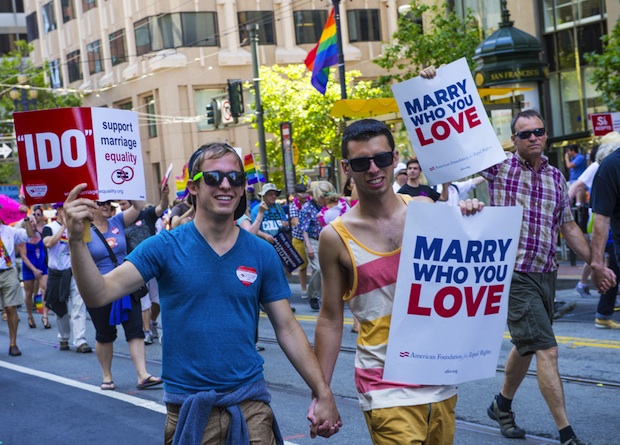Whether or not, as the saying goes, Virginia is for lovers, now that the 4th Circuit Court of Appeals has overthrown the state’s ban on gay marriage, it will at least be for those more inclined toward marriage, including same-sex couples. But perhaps more interesting than the decision itself, which I admit I support, is the thinking that animated Judge Henry Floyd, writing for the 2-1 majority.
The judge’s decision is striking because it speaks to something far bigger than the issue of same-sex marriage – as if that were not a big enough issue already. Judge Floyd addressed something which shapes how almost all of us make decisions about any important issue in our lives. He wrote:
“We recognize that same-sex marriage makes some people deeply uncomfortable. However, inertia and apprehension are not legitimate bases for denying same-sex couples due process and equal protection of the laws.”
Of course, those sentences fall toward the end of Floyd’s 46-page decision – one which focuses far more on very specific, and quite technical, issues related to the case. So nobody should imagine that the judge simply fired off an opinion based on his views regarding human decision making. But even if he had, it’s hard not to appreciate the wisdom of his observation quoted here.
How often do each of us find ourselves driven by inertia and apprehension? How often, especially as we contemplate a complex decision – one without a guaranteed outcome and almost certain costs associated with whatever path we choose – do we simply give in to the status quo or our fears of what might be if we go a new way?
Don’t get me wrong, I am, fundamentally (no pun intended) a deeply traditional person. For me, inertia and the positive power of inherited ways of doing things, can be quite valuable. And there is no doubt that in picking a largely uncharted path in whatever journey we are on – whether as a nation or as individuals – we could be creating some real problems for ourselves. I get all that. But I also get that not acting, not making bold decisions or doing things that take is beyond our comfort zones, can be at least as problematic.
I am also moved by Judge Floyd’s awareness that making inertia-based or apprehension-based decisions for ourselves is one thing, but it’s quite another thing when those fears and apprehensions abridge the decision-making of others. Being aware of who pays what price for policies we want, is at least as important as the policies themselves. Or as my father used to say, “it’s easy to order big when someone else is paying the bill”.
Judge Floyd’s decision will hardly end the debate about same-sex marriage. In fact, it will probably inspire further litigation. But when it comes to thinking about how any of us makes tough decisions, we can all learn a thing or two from this 4th circuit Judge. A little less inertia and a bit less apprehension would probably do us all a world of good, whatever we think about gay marriage, and most anything else.
Image: Kobby Dagan / Shutterstock.com

Listed for many years in Newsweek as one of America’s “50 Most Influential Rabbis” and recognized as one of our nation’s leading “Preachers and Teachers,” by Beliefnet.com, Rabbi Brad Hirschfield serves as the President of Clal–The National Jewish Center for Learning and Leadership, a training institute, think tank, and resource center nurturing religious and intellectual pluralism within the Jewish community, and the wider world, preparing people to meet the biggest challenges we face in our increasingly polarized world.
An ordained Orthodox rabbi who studied for his PhD and taught at The Jewish Theological Seminary, he has also taught the University of Pennsylvania, where he directs an ongoing seminar, and American Jewish University. Rabbi Brad regularly teaches and consults for the US Army and United States Department of Defense, religious organizations — Jewish and Christian — including United Seminary (Methodist), Yeshivat Chovevei Torah (Modern Orthodox) Luther Seminary (Lutheran), and The Jewish Theological Seminary (Conservative) — civic organizations including No Labels, Odyssey Impact, and The Aspen Institute, numerous Jewish Federations, and a variety of communal and family foundations.
Hirschfield is the author and editor of numerous books, including You Don’t Have To Be Wrong For Me To Be Right: Finding Faith Without Fanaticism, writes a column for Religion News Service, and appears regularly on TV and radio in outlets ranging from The Washington Post to Fox News Channel. He is also the founder of the Stand and See Fellowship, which brings hundreds of Christian religious leaders to Israel, preparing them to address the increasing polarization around Middle East issues — and really all currently polarizing issues at home and abroad — with six words, “It’s more complicated than we know.”

